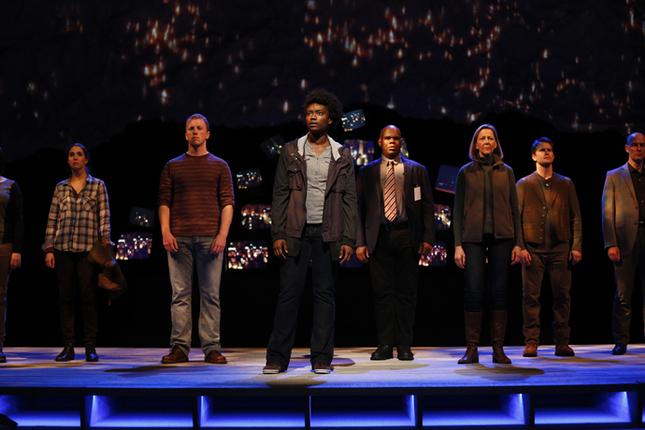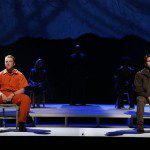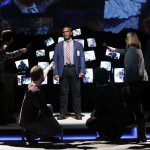Intimate, Emotive ‘Laramie Project’ Moved From Ford’s Theatre
By • January 17, 2014 0 1797

Theater has always been about the stories we tell ourselves and have passed on. Theater is bearing witness to how human beings have lived, live and may live tomorrow. It is history made into characters and stories, poetry and shout-outs and the talk amongst ourselves made into meaning, into thought and emotion, into tragedy and comedy, reality and fiction in front of us.
Sometimes, not often, but sometimes, theater gets caught up and changed in the history of the moment, the historic moment.
That was the case with Ford’s Theatre, and its season-opening production of “The Laramie Project,” a play created by playwright-director Moises Kaufman and members of the Tectonic Theatre Project from the raw material of interviews with people in Laramie, Wyo., in the aftermath of the 1998 murder of Matthew Shepard, a young gay man living in Laramie, as well as from comments by the actors who participated in the project themselves.
“The Laramie Project” became a kind of cause célèbre almost as much as the crime itself. The trial—involving a hate crime—and reaction to it spread throughout the nation with vigils, demonstrations and protests. This latest production was scheduled to have its season-opening premiere on Tuesday, Oct. 1. Instead, Ford’s Theatre became entangled with the biggest story in Washington, the impending partial government shutdown which became a reality at midnight.
As a result, Ford’s and its director Paul Tetreault learned that Ford’s, which operates on a public-private partnership with the National Park Service, would not be allowed to have performances—due to the government shutdown. In fact, all performances of the play at Ford’s Theatre have been cancelled through Oct. 6 because of the shutdown.
“This did not happen in the previous shutdown,” Tetreault said. “This whole thing defies logic. We were not sure exactly what was going to happen in terms of our play, but we still didn’t expect this. It was almost at the last minute. I started making phone calls, and luckily, the people at Woolly Mammoth Theatre were kind enough and could offer us the rehearsal space at their theater. And Tuesday was also a dark night there, with their ‘Detroit’ not being performed, which might have caused confusion. So, we scrambled to put on the play, because I think this is very important. It’s an important story that needs to be heard, because it had such a tremendous effect on our society.”
“The actors had not even been on that stage before,” Tetreault continued. “Obviously, there were no lights, no special sound effects, no set, a few props and costumes. We decided to have a VIP and media presentation because we wanted to have people have the opportunity to see it.”
It was learned yesterday that the Ford’s Theatre Society would present free performances of the play at the nearby First Congregational United Church of Christ on Friday, Oct. 4, and Tuesday, Oct. 8.
In terms of the shutdown, which has affected hundreds of thousands of government workers being furloughed and will cost the District of Columbia millions of dollars in terms of tourist revenue, not to mention of the political fallout throughout the country, the cancellation of a theatre production—even one as powerful as this play is—may be a footnote to some. Nevertheless, it remains an event of major import to the Ford’s Theatre Society, which stands to lose the entire run of the play which was scheduled through Oct. 27.
As it is, a curious and genuinely theatrical, human and historic event occurred when a terrific cast walked on stage at the downstairs Woolly Mammoth Theatre and began to tell the story of Matthew Shepard, his family, the residents and officials in the town of Laramie, Wyo. A deep sense of intimacy was created as they worked, walked, talked, introduced the people under the watchful eyes of an audience seated in five rows and totaling perhaps just under 100 persons.
It’s hard to imagine how this might have worked, what visuals and videos might have been used, how the view from afar in Ford’s Theatre might make you feel differently than being so close, but I suspect there is a difference. I kept thinking of last season’s production of “Our Town” at Ford’s for some reason.
As a theater writer or critic, one might hesitate to comment on the production, given that you’re not seeing the full production. But it’s a needless worry—this group of actors was so good, so in the zone, that there was no question of the play having an emotional impact. In fact, the result all but erased whatever distance normally exists between actors and audience. This cast— often-performing Holly Twyford, Craig Wallace, the always surprising Kimberly Gilbert, Kimberly Schraf, Mitchell Hebert, as well as Katherine Renee Turner, Chris Stezin, Paul Scanlan, Amy McWilliams and Eric M. Messner—bring special gifts as shape and speech shifters taking on many parts, providing introductions for the audience.
There’s not much there, physically, some chairs, a table, coats, caps, uniforms, the rest is all imagined resonance, shifts in voices, walks, gestures, and what the audience brings to the event with the requirements being an open heart, an open mind and perhaps open arms, if only.
Some of those qualities were obviously missing from the citizens of Laramie, a western college town in the middle of the big open space and the big lonely of the West, as they took in what had happened, that two locals had kidnapped, robbed, beaten and tortured a young gay man and left him to die, which he eventually did in the hospital. The reactions vary from shock, disbelief, well-hidden bigotry rising to the fore here and there, empathy, out and out hatred, anguish and grief, and growth and change.
“The Laramie Project” is a very theater piece of theater—here, after all, are actors playing other actors, who are also playing themselves and the pivotal members of the population of a medium-sized American town, caught up in a national fire storm about attitudes, biases, and sweeping change.
The production marks the 15th anniversary of the death of Matthew Shepard, adding poignancy to the event, and whatever else audiences can bring to this play, including the sure knowledge that much has changed in intervening. I thought about the play the day after, sitting at Tryst in Adams Morgan with a friend, watching one of the two male parents of an adopted little boy named Eli sitting on his parents’ lap. They live on the street where I live, seamless as the air we all breathe.





